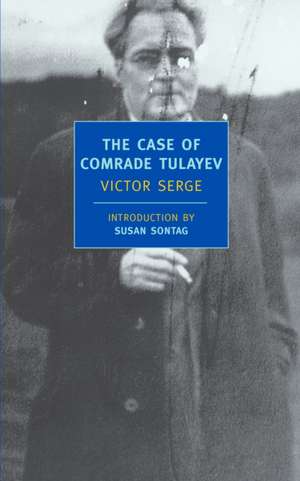The Case of Comrade Tulayev: New York Review Books Classics
Autor Victor Sergeen Limba Engleză Paperback – 14 noi 2003
Din seria New York Review Books Classics
-
 Preț: 88.86 lei
Preț: 88.86 lei -
 Preț: 99.24 lei
Preț: 99.24 lei - 16%
 Preț: 79.25 lei
Preț: 79.25 lei -
 Preț: 77.73 lei
Preț: 77.73 lei -
 Preț: 124.55 lei
Preț: 124.55 lei -
 Preț: 98.73 lei
Preț: 98.73 lei -
 Preț: 83.30 lei
Preț: 83.30 lei -
 Preț: 113.45 lei
Preț: 113.45 lei -
 Preț: 102.47 lei
Preț: 102.47 lei -
 Preț: 81.20 lei
Preț: 81.20 lei -
 Preț: 174.64 lei
Preț: 174.64 lei -
 Preț: 110.73 lei
Preț: 110.73 lei -
 Preț: 119.57 lei
Preț: 119.57 lei -
 Preț: 94.01 lei
Preț: 94.01 lei -
 Preț: 85.29 lei
Preț: 85.29 lei -
 Preț: 101.24 lei
Preț: 101.24 lei -
 Preț: 182.08 lei
Preț: 182.08 lei -
 Preț: 142.67 lei
Preț: 142.67 lei -
 Preț: 90.72 lei
Preț: 90.72 lei -
 Preț: 103.29 lei
Preț: 103.29 lei -
 Preț: 113.30 lei
Preț: 113.30 lei -
 Preț: 100.59 lei
Preț: 100.59 lei -
 Preț: 126.41 lei
Preț: 126.41 lei -
 Preț: 107.40 lei
Preț: 107.40 lei -
 Preț: 174.03 lei
Preț: 174.03 lei -
 Preț: 107.44 lei
Preț: 107.44 lei -
 Preț: 89.27 lei
Preț: 89.27 lei -
 Preț: 85.34 lei
Preț: 85.34 lei -
 Preț: 90.09 lei
Preț: 90.09 lei -
 Preț: 119.36 lei
Preț: 119.36 lei -
 Preț: 99.60 lei
Preț: 99.60 lei -
 Preț: 102.25 lei
Preț: 102.25 lei -
 Preț: 127.42 lei
Preț: 127.42 lei -
 Preț: 96.27 lei
Preț: 96.27 lei -
 Preț: 85.97 lei
Preț: 85.97 lei -
 Preț: 136.91 lei
Preț: 136.91 lei -
 Preț: 161.86 lei
Preț: 161.86 lei -
 Preț: 105.17 lei
Preț: 105.17 lei -
 Preț: 88.86 lei
Preț: 88.86 lei -
 Preț: 94.83 lei
Preț: 94.83 lei -
 Preț: 118.15 lei
Preț: 118.15 lei -
 Preț: 87.20 lei
Preț: 87.20 lei -
 Preț: 95.45 lei
Preț: 95.45 lei -
 Preț: 97.50 lei
Preț: 97.50 lei -
 Preț: 111.96 lei
Preț: 111.96 lei -
 Preț: 133.18 lei
Preț: 133.18 lei -
 Preț: 100.18 lei
Preț: 100.18 lei -
 Preț: 75.23 lei
Preț: 75.23 lei -
 Preț: 91.13 lei
Preț: 91.13 lei -
 Preț: 94.86 lei
Preț: 94.86 lei
Preț: 112.37 lei
Nou
Puncte Express: 169
Preț estimativ în valută:
21.51€ • 23.37$ • 18.08£
21.51€ • 23.37$ • 18.08£
Carte disponibilă
Livrare economică 29 martie-12 aprilie
Livrare express 15-21 martie pentru 27.96 lei
Preluare comenzi: 021 569.72.76
Specificații
ISBN-13: 9781590170649
ISBN-10: 1590170644
Pagini: 400
Dimensiuni: 127 x 204 x 22 mm
Greutate: 0.39 kg
Ediția:Main.
Editura: NEW YORK REVIEW OF BOOKS
Seria New York Review Books Classics
Locul publicării:United States
ISBN-10: 1590170644
Pagini: 400
Dimensiuni: 127 x 204 x 22 mm
Greutate: 0.39 kg
Ediția:Main.
Editura: NEW YORK REVIEW OF BOOKS
Seria New York Review Books Classics
Locul publicării:United States
Notă biografică
Victor Serge (1890ߝ1947) was born Victor Lvovich Kibalchich to Russian anti-Tsarist exiles, impoverished intellectuals living “by chance” in Brussels. A precocious anarchist firebrand, young Victor was sentenced to five years in a French penitentiary in 1912. Expelled to Spain in 1917, he participated in an anarcho-syndicalist uprising before leaving to join the Revolution in Russia. Detained for more than a year in a French concentration camp, Serge arrived in St. Petersburg early in 1919 and joined the Bolsheviks, serving in the press services of the Communist International. An outspoken critic of Stalin, Serge was expelled from the Party and arrested in 1929. Nonetheless, he managed to complete three novels (Men in Prison, Birth of Our Power, and Conquered City) and a history (Year One of the Russian Revolution), published in Paris. Arrested again in Russia and deported to Central Asia in 1933, he was allowed to leave the USSR in 1936 after international protests by militants and prominent writers like André Gide and Romain Rolland. Using his insider’s knowledge, Serge published a stream of impassioned, documented exposés of Stalin’s Moscow show trials and of machinations in Spain, which went largely unheeded. Stateless, penniless, hounded by Stalinist agents, Serge lived in precarious exile in Brussels, Paris, Vichy France, and Mexico City, where he died in 1947. His classic Memoirs of a Revolutionary and his great last novels, Unforgiving Years and The Case of Comrade Tulayev (both available as NYRB Classics), were written “for the desk drawer” and published posthumously.
Susan Sontag (1933ߝ2004) was a novelist, playwright, filmmaker, and one of the most influential critics of her generation. Her books include Against Interpretation, On Photography, Illness as Metaphor, and The Volcano Lover.
Susan Sontag (1933ߝ2004) was a novelist, playwright, filmmaker, and one of the most influential critics of her generation. Her books include Against Interpretation, On Photography, Illness as Metaphor, and The Volcano Lover.
Recenzii
One of the great 20th-Century Russian novels…there are extraordinary passages of natural description, a beauty that defies what takes place within it.
— Nicholas Lezard, The Guardian
The brilliance of his novel utterly ineluctable as it sweeps across 1930’s Europe from the gulags to the Kremlin, to Paris and to Barcelona.
— The Times (London)
The Case of Comrade Tulayev is gritty and rough, saturated in the squalor of Moscow life; but it also pulses with lyrical flights that take us up into the stars, which represent for Serge the regenerative, transformative moments the History promises but has yet to deliver. Tulayev is infused with mysticism; it is a work of cosmic longing, as if Serge is turning to the eternity of the universe itself to avoid the utter despair right in front of his face.
— Matthew Price, Bookforum
It is a protest novel no less significant and no more dated than Solzhenitsyn’s One Day in the Life of Ivan Denisovich. These novels recreate the feel of daily existence years ago, animate the history texts, and give readers an irreplaceable personal perspective. Books like these ensure the past is not forgotten….The quality of life depicted in The Case of Comrade Tulayev showed why the Stalinist monolith could not endure.
— Joe Auciello, Socialist Action
Given the standard of fortitude, and given the contempt Serge always felt for Stalin’s collaborators, a remarkable feature of The Case of Comrade Tulayev is its chiaroscuro….That Serge intended no lenience here we may be sure, but we may likewise be sure that he would never have swallowed the later euphemisms and half-truths of Khrushchev, putting blame for all the enormities of an epoch on the evil of a single individual.
— Christopher Hitchens, The Atlantic Monthly
Serge can recognize the range of experience and responses that make up the texture of life in even the most nightmarishly repressive system.
— Scott McLemee
— Nicholas Lezard, The Guardian
The brilliance of his novel utterly ineluctable as it sweeps across 1930’s Europe from the gulags to the Kremlin, to Paris and to Barcelona.
— The Times (London)
The Case of Comrade Tulayev is gritty and rough, saturated in the squalor of Moscow life; but it also pulses with lyrical flights that take us up into the stars, which represent for Serge the regenerative, transformative moments the History promises but has yet to deliver. Tulayev is infused with mysticism; it is a work of cosmic longing, as if Serge is turning to the eternity of the universe itself to avoid the utter despair right in front of his face.
— Matthew Price, Bookforum
It is a protest novel no less significant and no more dated than Solzhenitsyn’s One Day in the Life of Ivan Denisovich. These novels recreate the feel of daily existence years ago, animate the history texts, and give readers an irreplaceable personal perspective. Books like these ensure the past is not forgotten….The quality of life depicted in The Case of Comrade Tulayev showed why the Stalinist monolith could not endure.
— Joe Auciello, Socialist Action
Given the standard of fortitude, and given the contempt Serge always felt for Stalin’s collaborators, a remarkable feature of The Case of Comrade Tulayev is its chiaroscuro….That Serge intended no lenience here we may be sure, but we may likewise be sure that he would never have swallowed the later euphemisms and half-truths of Khrushchev, putting blame for all the enormities of an epoch on the evil of a single individual.
— Christopher Hitchens, The Atlantic Monthly
Serge can recognize the range of experience and responses that make up the texture of life in even the most nightmarishly repressive system.
— Scott McLemee
















